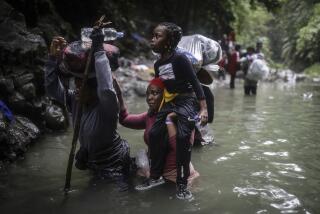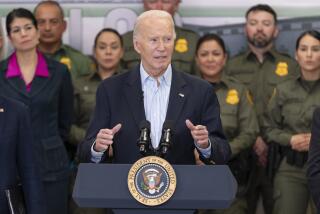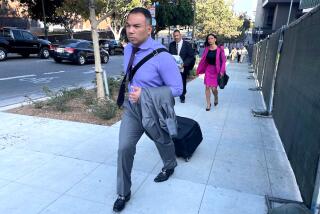U.S. blacklisting seems to have little consequence in Mexico
The U.S. government has blacklisted more Mexican individuals and companies this year than any other single country or group — and that includes North Korea, Iran, Syria and Al Qaeda.
Three hundred Mexicans and 180 Mexican companies are on the so-called kingpin designation list, the Treasury Department’s roster of people and entities suspected of laundering money for drug traffickers or working for them in other capacities. U.S. banks, companies and people are barred from doing business with them.
Among those recently listed is the La Numero Uno cantina in Mexico City, a bar-restaurant with stained-glass touches that lend it the look of a church.
A hand-lettered sign posted at the entrance warns patrons that it doesn’t take American Express. It doesn’t mention why: The establishment is suspected of helping launder money for a criminal network affiliated with Joaquin “El Chapo” Guzman, the world’s most-wanted drug capo, and legally off-limits to American Express and other U.S. companies.
More suspects from Mexico were listed in the first seven months of fiscal year 2011 than the two previous fiscal years combined, U.S. officials say.
The Obama administration hopes these sanctions will prove a deterrent to money launderers and others who serve traffickers, and thus cut into the cartels’ staggering profits. But there is ample evidence that the sanctions have little impact.
The effort is modeled after what U.S. officials saw as the successful campaign against cartels in Colombia in the 1990s. Blacklisting Colombian entities eventually strangled traffickers’ ability to invest in major businesses and use the national banking system. Being named on the U.S. Treasury blacklist came to be known as muerte civil, or civil death.
In Mexico, there is an essential difference. The sanctions list is not at all binding inside Mexico. Unlike Colombia, Mexico does not have laws that allow authorities to freeze assets of a person or company, or otherwise punish them, just because they appear on a U.S. blacklist.
“In Colombia it worked really well. We are not there yet in Mexico,” said a senior U.S. Treasury official. “We put out the guidelines, we recommend they [the banks and authorities] consult the lists.… What we want is them to close the accounts. We know they are not doing that.”
The list includes lawyers and accountants; horse farms, restaurants, boutiques, milk producers, construction companies and day-care centers; air and land transport fleets; entire networks of seemingly legitimate enterprises allegedly used to help conceal or smuggle billions of dollars of drug money raked in by Mexican cartels every month.
But the blacklisted businesses stay in business.
In December 2007, the U.S. blacklisted the companies and 10 members of the so-called Cazares Salazar Financial Network, which according to U.S. authorities is a booming money-laundering branch of the Sinaloa cartel run by Blanca Cazares, sister of one of the cartel’s top chieftains, Victor Cazares.
Two years later, a Times reporter visited one of the blacklisted businesses, part of a chain of Blanca’s boutiques in the Sinaloan capital, Culiacan, and found it very much open. Upon buying a piece of clothing, the reporter received a printed receipt; at the top was the name of one of Blanca’s alleged accomplices, “designated kingpin” Jorge Patraca Ponce.
More recently, Treasury officials cite as a key success the blacklisting a year ago of a separate group, headed by Alejandro Flores Cacho. For the first time, U.S. officials shared intelligence with their Mexican counterparts before going public. This allowed Mexican authorities to gather the authorizations needed to actually seize or freeze some of the Flores Cacho assets named in the blacklist.
But the forfeiture amounted to no more than $2 million, U.S. officials said, a tiny fraction of the group’s earnings.
U.S. authorities allege that Flores Cacho, a pilot, ran a vast air-cargo transport network to move drugs and money for Sinaloa cartel leader Guzman. Flores Cacho remains a fugitive.
Targets of the U.S. sanctions included 16 of Flores Cacho’s associates, among them his wife and brother, and 12 front companies. Those included a flight school, hangars, a cattle farm and the La Numero Uno cantina, which on weekends dishes up paella and kid goat.
On a recent day, it was clearly in business. A few tables were occupied as soccer played on TVs arrayed above an expanse of rustic wooden tables. The manager on duty said the blacklist designation had done little to disrupt business — less, in fact, than a construction project on the street in front.
He said the money-laundering charges were “not true,” and that owners hoped to persuade U.S. officials to take the cantina off the list.
If the sanctions have not yet had the effect of shutting down drug cartels’ businesses, they do appear to have had an unexpected consequence: Several Mexicans who learned they were on the “designated kingpin” list found that their U.S. visas had been revoked, limiting their ability to travel and conduct business they claimed was legitimate.
They went to the U.S. Embassy in Mexico City to protest their listing and try to revive their visas. U.S. law enforcement officials stationed at the embassy jumped at the chance to interrogate them, according to a person who participated.
And when the Americans finished asking questions, they telephoned investigators in the Mexican attorney general’s office and alerted them they could pick up the alleged cartel associates as they walked out of the embassy. And that they did.
Times staff writer Brian Bennett in Washington contributed to this report.
More to Read
Start your day right
Sign up for Essential California for news, features and recommendations from the L.A. Times and beyond in your inbox six days a week.
You may occasionally receive promotional content from the Los Angeles Times.







